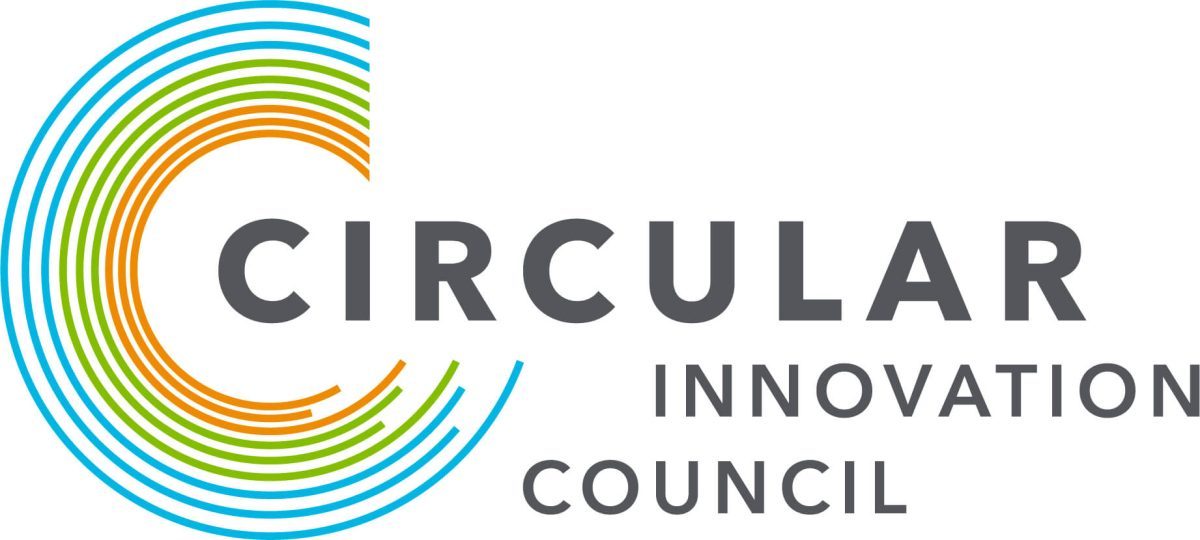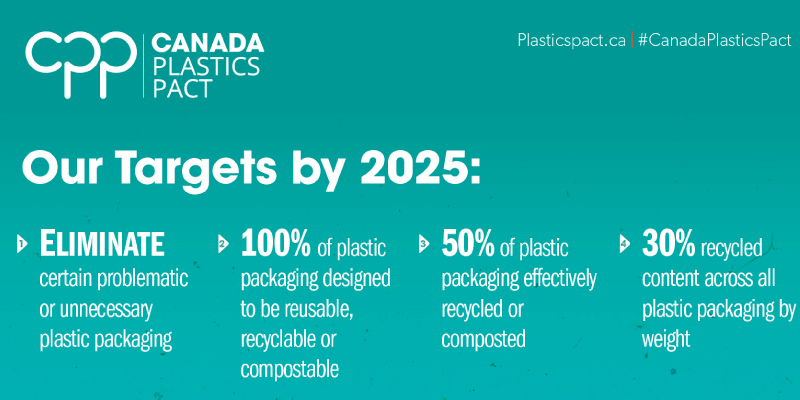
Today, Canada’s relationship to plastic waste fundamentally changed: the Canada Plastics Pact (CPP) launched to end plastic waste and pollution. The Pact brings together key players to collectively work towards ambitious 2025 goals that they could never achieve on their own.
More than 40 Partners — including Circular Innovation Council — have joined the Canada Plastics Pact, representing diverse parts of the plastics value chain, from leading brands to waste management companies, government institutions, and NGOs. Because plastic packaging accounts for 47% of all plastic waste, it is the immediate focus of the CPP’s collective efforts.
An ambitious pre-competitive, multi-stakeholder platform, the CPP will enable companies across the Canadian plastics value chain to collaborate and innovate. It will build on significant work that has already been underway to reduce plastics waste, and will grow over time. Together, Partners will rethink the way they design, use, and reuse plastics, thereby charting a path toward a circular economy for plastic by 2025.
With an eye for bold systemic change, the CPP will work to eliminate the plastics we don’t need, innovate to ensure that the plastics we do need are reusable, recyclable, or compostable, and keeping them in the economy and out of the environment.

Reducing plastic waste and redefining its value requires the consciousness and co-operation of everyone. The Canada Plastics Pact provides an important platform to support organizations and individuals, and activates our common goal to eliminate plastic waste. Through broad and open collaboration across the entire value chain – from design and production to consumption and end-of-life – there is untapped and unprecedented opportunity for Canada to join global leaders and advance a circular economy for plastics.
Joining together through the CPP is a diverse group of leaders from across Canada’s plastics value chain. While I am impressed by their genuine commitment to achieving a zero plastic waste economy, it is their willingness to break down barriers between each other to scale truly innovative solutions that I find most inspiring.
Canada is the latest country to join the Ellen MacArthur Foundation’s Plastics Pact network, a globally-aligned response to plastic waste and pollution. In line with the Ellen MacArthur Foundation’s vision of a circular economy for plastic, the CPP facilitates innovation and knowledge sharing, and drives collaborative action and solutions tailored to Canada’s unique needs and challenges.
By setting clear 2025 targets and working together to achieve them, businesses and policymakers in the Canada Plastics Pact have taken an important step on the journey to a circular economy for plastic, in which it never becomes waste or pollution. We are delighted to welcome the Canada Plastics Pact in our growing global network of Pacts, and hope to see many other organisations unite behind our vision of a circular economy for plastic, which brings together more than 1,000 organisations worldwide through our New Plastics Economy initiative.
Sonja Wegge
Plastics Pact Programme Manager
Ellen MacArthur Foundation
The immediate next steps for the CPP to achieve its goals by 2025 is to develop a roadmap for action. To be fully transparent and ensure measurable action, a CPP progress report will be made publicly available each year.
Together, the partners in the Canada Plastics Pact will fundamentally change the way Canadians use and reuse plastic, while securing a resilient economy that flourishes within nature’s limits.
Canadian Beverage Association, Canadian Produce Marketing Association, Canadian Stewardship Services Alliance, Canadian Tire, Circular Innovation Council | Recycling Council of Ontario, Circular Plastics Taskforce, Cleanfarms, Club Coffee, Coca-Cola Canada, Council of the Great Lakes Region, Danone Canada, David Suzuki Foundation, EFS-plastics, Emterra Group, Environment and Climate Change Canada, Food, Health & Consumer Products of Canada, General Mills Canada, Ice River Sustainable Solutions, International Institute for Sustainable Development, Keurig Dr Pepper Canada, Kraft Heinz Canada, Loblaw Companies Limited, Maple Leaf Foods, Mars Canada, Merlin Plastics, Metro Vancouver, Mondelez Canada, National Zero Waste Council, Natural Step Canada, Nestlé Canada, Ocean Wise, PAC Packaging Consortium, Pyrowave, Recycling Council of Alberta, Retail Council of Canada, Return-It, Ryse Solutions, Save-On-Foods, Smart Prosperity Institute, Unilever Canada, Walmart Canada
The Canada Plastics Pact (CPP) is tackling plastic waste and pollution, as a multi-stakeholder, industry-led, cross-value chain collaboration platform. The CPP brings together Partners who are united behind a vision of creating a circular economy in Canada in which plastic waste is kept in the economy and out of the environment. It unites businesses, government, non-governmental organizations and other key actors in the local plastics value chain behind clear actionable targets for 2025. By aligning with the Ellen MacArthur Foundation’s global Plastics Pact network and the New Plastics Economy’s common vision of a circular economy for plastics, CPP Partners commit to fundamentally rethinking the way we design, use, and reuse plastic packaging.
Further information: plasticspact.ca | @CanadaPact
The Ellen MacArthur Foundation was launched in 2010 with the aim of accelerating the transition to the circular economy. Since its creation, the charity has emerged as a global thought leader, putting the circular economy on the agenda of decision-makers around the world. The charity’s work focuses on seven key areas: insight and analysis; business; institutions, governments, and cities; systemic initiatives; circular design; learning; and communications.
Circular Innovation Council – originally established as Recycling Council of Ontario in 1978 – believes that shifting production and consumption in a circular economy simultaneously supports environmental, economic, and social objectives of sustainable living. We are inclusive and collaborative among supply and value chains, and seek to advance business models, products, and services that can deliver on the values and benefits of a circular economy. Through better resource efficiency – reuse, share, repair, refurbish, remanufacture, recycle in a closed-loop system – we can reduce waste, pollution, and carbon emissions. In doing so, we showcase innovation by putting circular economy concepts into action.
The Plastic Action Centre is Canada’s only single platform to learn about plastics, make connections, and exchange information to take action. It offers resources and tools, facts and figures, market developments, business efforts, regulatory advances and policy initiatives, as well as ongoing domestic and international media coverage.
Waste Reduction Week’s Plastics Thursday highlights how the circular economy can reduce the use and waste of plastics; motivate improved recyclability of plastic goods; and increase the value of recycled plastic by improving product design, use, and end of life management. On this day, we focus our recognition and celebration of champions that support the need to reduce plastic waste and are doing their part to take action.
We respectfully acknowledge that we live, work and play on the traditional territory of many Indigenous Nations and we humbly extend our respect to Indigenous individuals, communities and Elders, past and present, as the traditional custodians of this land.
Circular Innovation Council is a registered charity.
Charity Registration Number: 119112118 RR 0001